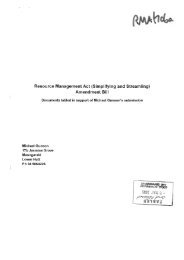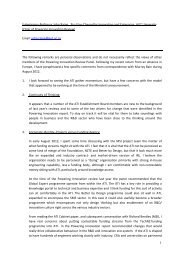Parliamentary Debates (Hansard) - New Zealand Parliament
Parliamentary Debates (Hansard) - New Zealand Parliament
Parliamentary Debates (Hansard) - New Zealand Parliament
You also want an ePaper? Increase the reach of your titles
YUMPU automatically turns print PDFs into web optimized ePapers that Google loves.
16 May 2009 Local Government (Auckland Reorganisation) Bill 3671<br />
[Mr Chairman, my understanding is that when one speaks in Māori in this House,<br />
the clock is stopped until the end of that address in Māori. It is turned on again once<br />
one starts speaking in English.]<br />
The CHAIRPERSON (Lindsay Tisch): That is a very good point, and I thank the<br />
member for bringing it to my attention. The interpretation is in addition to what the<br />
member is saying, so the time allocation is not reduced. In the case of the previous<br />
speaker, Shane Jones, the clock was turned off while we had the interpretation.<br />
Hon SHANE JONES (Labour): I raise a point of order, Mr Chairperson. Thank you<br />
for those words of assistance. The point remains, however, that during the course of the<br />
debate on this particular part there will be a great deal of bilingual debate. We need<br />
reassurance. When we lapse from one language to the other, the timekeeping will be<br />
essential. This debate is the only chance that that portion of Auckland’s population will<br />
ever hear their language being spoken in defence of their rights.<br />
The CHAIRPERSON (Lindsay Tisch): Thank you for that point. In terms of the<br />
timekeeping, there are two of us here who keep the time. In fact, in relation to the<br />
member who spoke before—I know that the Hon Trevor Mallard is keeping his eye on<br />
the clock—I gave the member about 10 seconds extra, because we had not turned off<br />
the clock as quickly as we might have.<br />
Hon DAVID PARKER (Labour): I rise to support proposed new Part 5 of the<br />
Local Government (Auckland Reorganisation) Bill. In doing so I put in context why we<br />
think it is important that this specificity is laid down now: to ensure that in future we<br />
achieve Māori representation.<br />
I think it reflects no honour at all upon the National Party that, after 3 days of debate<br />
on a bill that is being considered in urgency and that is not going to select committee,<br />
not one of the amendments that have been put by the Labour Party, by the Green Party,<br />
or by others other than the Government have been supported by the Government. So<br />
after 3 days of debate, the bill is as it was proposed by the National Party. People would<br />
think on that basis that we have an infallible Government. This Government is so<br />
confident of its own abilities that it thinks it does not have to listen—not only will it not<br />
listen to the will of the people through the select committee process, but it cannot even<br />
listen to Opposition submissions in order to find kernels of good ideas that it can bring<br />
itself to agree with.<br />
People considering whether that is a realistic assessment of how this Government<br />
deals with personnel, and of the appropriateness of appointments that it causes to be<br />
made to bodies, need only reflect on mistakes that have been made by the Government<br />
in the last week in terms of the appointment of Christine Rankin to the Families<br />
Commission. It is the Government’s right to appoint her, but it shows that if people<br />
have the ability to make appointments, or to control who the representatives of the<br />
people on important bodies like councils—<br />
The CHAIRPERSON (Lindsay Tisch): I am sorry to interrupt the member. I say to<br />
those members who are obstructing my view that I would like to be able to see the<br />
speaker when he is speaking.<br />
Hon DAVID PARKER: The appointment of Christine Rankin to the Families<br />
Commission shows that it is very important to have checks and balances on those who<br />
control the appointments, in order to make sure that we have fair representation, and<br />
that we do not have inappropriate appointments or a lack of representation. The example<br />
of Christine Rankin shows that this Government, above all others, is not infallible when<br />
it comes to the matter of representation and who it appoints to bodies.<br />
Representation is what lies behind proposed new Part 5. This part inserts<br />
mechanisms to make sure that the discretion of those involved in the future as to who<br />
should be elected to councils and what groups ought to have some representation is






![Full evidence text [PDF 8908k] - New Zealand Parliament](https://img.yumpu.com/14025494/1/184x260/full-evidence-text-pdf-8908k-new-zealand-parliament.jpg?quality=85)
![−3 JUN 2009 IRELEASED] - New Zealand Parliament](https://img.yumpu.com/12829724/1/185x260/3-jun-2009-ireleased-new-zealand-parliament.jpg?quality=85)
![Full paper text [PDF 3515k] - New Zealand Parliament](https://img.yumpu.com/11267192/1/184x260/full-paper-text-pdf-3515k-new-zealand-parliament.jpg?quality=85)


![Full evidence text [PDF 9k] - Parliament](https://img.yumpu.com/7938085/1/184x260/full-evidence-text-pdf-9k-parliament.jpg?quality=85)





